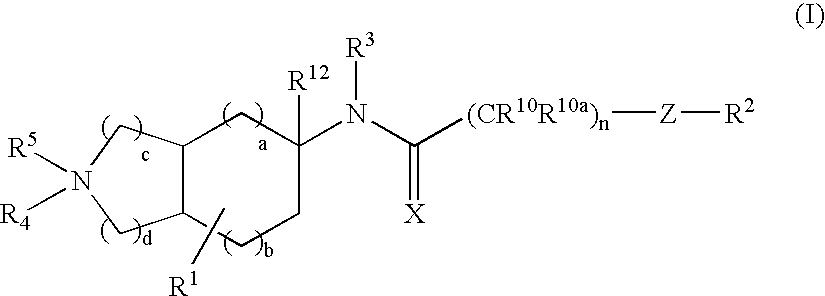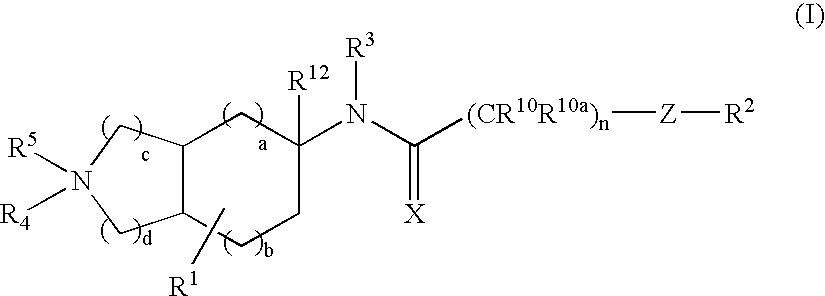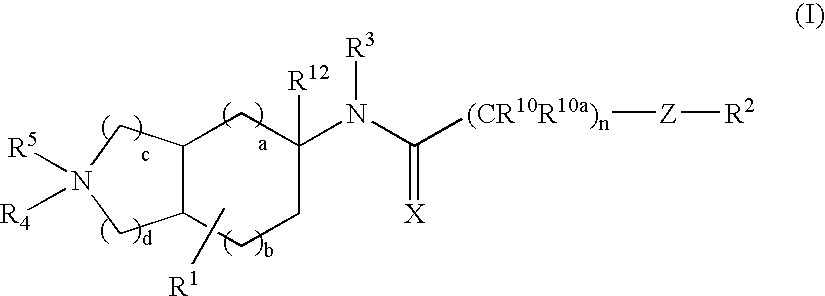Substituted bicycloalkylamine derivatives as modulators of chemokine receptor activity
a technology of chemokine receptor and substituted bicycloalkylamine, which is applied in the field of modulators of chemokine receptor activity, can solve the problems that the prior art does not disclose nor suggest the unique combination of structural fragments
- Summary
- Abstract
- Description
- Claims
- Application Information
AI Technical Summary
Benefits of technology
Problems solved by technology
Method used
Image
Examples
example 1
Part A: Preparation of endo-5-benzylaminooctahydrocyclopenta[c]pyrrole-2-carboxylic acid tert-butyl ester
[0290] 5-Oxooctahydrocyclopenta[c]pyrrole-2-carboxylic acid tert-butyl ester (prepared according to the procedure described by D. P. Becker and D. L. Flynn, Tetrahedron, 1993, 49, 5047; 500 mg, 2.2 mmol) and benzylamine (242 μL, 2.2 mmol) were dissolved in 1,2-dichloroethane (8 mL). Acetic acid (190 μL, 3.3 mmol) and sodium triacetoxyborohydride (706 mg, 3.3 mmol) were added sequentially, and the mixture was stirred at room temperature for 2.75 h. Aqueous sodium hydroxide (1.0 N) was added and the mixture was stirred rapidly for a few minutes. The layers were separated, and the aqueous phase was extracted with dichloromethane. The combined organic phases were dried over sodium sulfate and concentrated under vacuum to yield a residue. The residue was purified by flash chromatography to provide the title compound as a pale yellow oil (538 mg, 77%). 1H NMR (400 MHz, CDCl3) δ 7.15 (...
example 2
Preparation of endo-N-[(2-isopropyloctahydrocyclopenta[c]pyrrol-5-ylcarbamoyl)methyl]-3-trifluoromethylbenzamide trifluoroacetic acid salt
[0294] The product of Example 1 Part D was converted to the free base by partitioning between ethyl acetate and 1.0 N aqueous sodium hydroxide. The organic phase was dried over sodium sulfate and concentrated. A portion of this material (27 mg, 76 μmol) was dissolved in 1,2-dichloroethane (2 mL) and the resulting solution was treated sequentially with acetone (17 μL, 228 μmol), acetic acid (22 μL, 380 μmol) and sodium triacetoxyborohydride (48 mg, 228 μmol). The mixture was stirred at room temperature for 125 min, then was concentrated under vacuum to yield a residue. The residue was partitioned between ethyl acetate and saturated aqueous sodium hydrogen carbonate. The aqueous phase was extracted twice with additional ethyl acetate. The combined organic phases were dried over sodium sulfate and concentrated under vacuum to provide a glass. 1H NMR...
example 3
Part A: Preparation of allyl-hex-2-ynyl-carbamic acid tert-butyl ester
[0295] A solution of allyl-prop-2-ynyl-carbamic acid tert-butyl ester (prepared according to the method of Boger et al., J. Am. Chem. Soc., 1996, 118, 2109; 1.95 g, 10 mmol) in anhydrous tetrahydrofuran (10 mL) was stirred at 0° C. and treated with n-butyllithium (1.6 M solution in hexane; 7.2 mL, 11.5 mmol) during a 5 min period. After being stirred for an additional 5 min, the solution was treated sequentially with hexamethylphosphoramide (2 mL) and a solution of 1-iodopropane (1.71 mL, 17.5 mmol) in tetrahydrofuran (2 mL). After 65 min, the cooling bath was removed and the mixture was allowed to warm to room temperature where it stirred for 80 min. At the conclusion of this period, saturated aqueous ammonium chloride was added, followed by water to dissolve the solids. The mixture was extracted with ethyl acetate, and the combined organic phases were washed with saturated aqueous sodium chloride, dried over so...
PUM
| Property | Measurement | Unit |
|---|---|---|
| molecular weight | aaaaa | aaaaa |
| pH | aaaaa | aaaaa |
| temperature | aaaaa | aaaaa |
Abstract
Description
Claims
Application Information
 Login to View More
Login to View More - R&D
- Intellectual Property
- Life Sciences
- Materials
- Tech Scout
- Unparalleled Data Quality
- Higher Quality Content
- 60% Fewer Hallucinations
Browse by: Latest US Patents, China's latest patents, Technical Efficacy Thesaurus, Application Domain, Technology Topic, Popular Technical Reports.
© 2025 PatSnap. All rights reserved.Legal|Privacy policy|Modern Slavery Act Transparency Statement|Sitemap|About US| Contact US: help@patsnap.com



